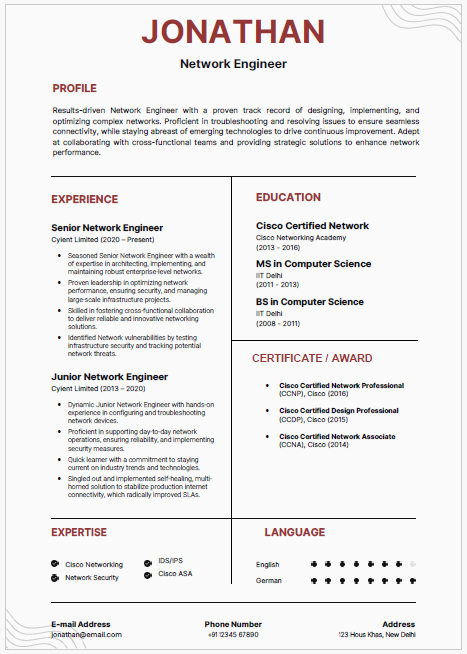Network Engineer
MS in Computer Science

About this template
This is a very simple and professional resume which can effectively highlight your skills and experiences in a clear and concise manner.
Its clean design ensures easy readability, making it easier for recruiters to quickly assess your qualifications. This resume is tailored to make a strong impression and increase your chances of landing your desired job.
Some most common and important interview questions for experienced network engineer
For experienced network engineers, interview questions typically focus on their technical expertise, problem-solving abilities, and practical experience with network systems. Here are ten common and important interview questions:
1. Can you describe your experience with network design and architecture?
This question assesses your ability to design and implement network solutions. Discuss your experience with designing network topologies, selecting appropriate hardware, and creating scalable and secure network architectures based on organizational needs.
2. How do you troubleshoot network connectivity issues?
Interviewers want to understand your approach to diagnosing and resolving network problems. Explain your troubleshooting process, including the tools you use, such as ping, traceroute, and network analyzers, to identify and fix connectivity issues.
3. What is your experience with network security protocols and practices?
Network security is crucial in protecting data and infrastructure. Describe your knowledge of security protocols like VPNs, firewalls, IDS/IPS, and how you implement security measures to safeguard networks from threats and breaches.
4. How do you manage and configure network devices?
This question focuses on your experience with configuring routers, switches, and other network devices. Discuss the configuration processes, including the use of CLI commands and network management software, to optimize network performance.
5. Can you explain your experience with network performance monitoring and optimization?
Monitoring and optimizing network performance is key to maintaining efficiency. Share your experience with performance monitoring tools, such as SNMP or NetFlow, and how you address issues like bandwidth utilization and latency.
6. What are your methods for managing network upgrades and migrations?
Managing network changes requires careful planning and execution. Explain how you handle network upgrades, including risk assessment, planning, testing, and implementation, to ensure minimal disruption and compatibility with existing systems.
7. How do you stay current with emerging networking technologies and trends?
Continuous learning is important in the rapidly evolving field of networking. Discuss how you keep up with new technologies, such as software-defined networking (SDN) and 5G, through professional development, training, and industry resources.
8. Can you describe a challenging network problem you resolved and how you approached it?
This question assesses your problem-solving skills and experience. Provide a detailed example of a complex network issue you faced, the steps you took to resolve it, and the outcome, demonstrating your analytical and technical abilities.
9. What experience do you have with network automation and scripting?
Network automation and scripting can improve efficiency and reduce manual tasks. Discuss your experience with automation tools like Ansible or scripting languages such as Python to automate network management tasks and streamline operations.
10. How do you handle network documentation and compliance?
Proper documentation and compliance are essential for effective network management. Explain how you maintain accurate network documentation, such as network diagrams and configuration records, and ensure compliance with industry standards and organizational policies.
Conclusion:
These questions help interviewers gauge your expertise, problem-solving skills, and ability to manage and optimize network systems effectively. Providing detailed and thoughtful answers will demonstrate your suitability for the role and your depth of experience in network engineering.